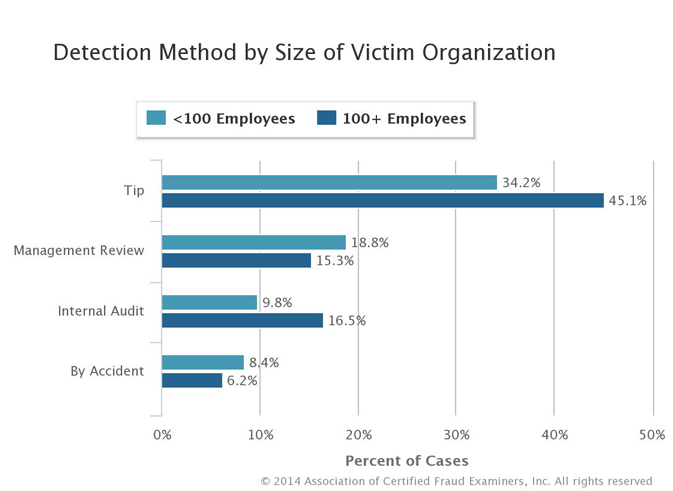Is someone at your business “cooking the books” behind your back? Don’t bet against it. According to the Association of Certified Fraud Examiners (ACFE), small businesses (with fewer than 100 employees) average 28 percent more fraud losses than large businesses. On average, those businesses lost more than $150,000 each. The ACFE recently provided methods to detect and prevent fraud in small businesses. Here’s an overview.
Why Employee Fraud Is Hard to Predict
While the U.S. Small Business Administration (SBA) recommends background checks during the hiring process, this will only slightly reduce risk. According to the ACFE:
- More than 80 percent of fraudsters had never previously been punished or terminated by an employer for conduct.
- Most fraudsters work for their employers for years before committing fraud. Statistically speaking, the more tenure an employee has, the greater the probability that they will steal from you.
Additionally, there are several different forms of employee fraud, so it’s hard to “cover your bases.” The ACFE found the most common forms of fraud for small businesses are corruption (including conflict of interest and bribery), billing fraud, check tampering, misappropriations and skimming.
The Best Detection Methods
For small family businesses, international corporations and everything in between, the most common way employee fraud is detected is through tips. For small businesses alone, employee tipsters account for more than 30 percent of the cases reported by the ACFE. And the more anonymous the tipster can remain, the more likely they are to report something.
This can be disheartening for small businesses, where it’s nearly impossible to do anything anonymously. The SBA reports fewer than 20 percent of small companies have an anonymous reporting system in place, compared with 70 percent of larger firms.
As shown on the chart below, management reviews and internal audits are the second and third best ways to detect employee fraud in a small business. The fourth way? By accident. (Click here to see the entire list.)

These subsequent ways to detect fraud have one thing in common: They require the owner to pay attention. In a typical small business, it’s not uncommon to have one bookkeeper in charge of all financial activities. No matter how long that person has been in the business or how much that person is trusted (or even related), this can be dangerous. While adding one more person to the bookkeeping “department” may reduce the risk, the ACFE warns of employee collusion. Collusion allows employees to evade independent checks and other anti-fraud controls, enabling them to steal even larger amounts. In fact, as the number of perpetrators increases, losses rise dramatically.
Ways to Curb Employee Fraud
With the stakes so high, it’s important to learn how to prevent employee fraud, or at least be able to spot it efficiently. Some steps in doing that include:
- Installing checks and balances. As a small business owner, you should OPEN and read the bank statements as well as sign the checks. It’s also a good idea to work with an outside accountant to review financials.
- Paying attention to the warning signs. In the vast majority (92%) of cases, at least one common behavioral red flag was identified. Do you have an employee who seems to be living above their means? A bookkeeper or manager who refuses to take time off or delegate work? These could be valuable clues.
- Putting your employees at ease. Remember that tips are the best way to detect fraud. Be sure to create a work culture where employees feel safe to report suspicions without fear of retaliation.
here may be other ways to reduce your risk, depending on your industry and business size. Sometimes it takes just a few simple changes, other times an external audit or forensic investigative accounting is in order. If you have any questions or concerns about your company’s vulnerabilities, feel free to contact us.
Image Copyright: citalliance / 123RF Stock Photo


